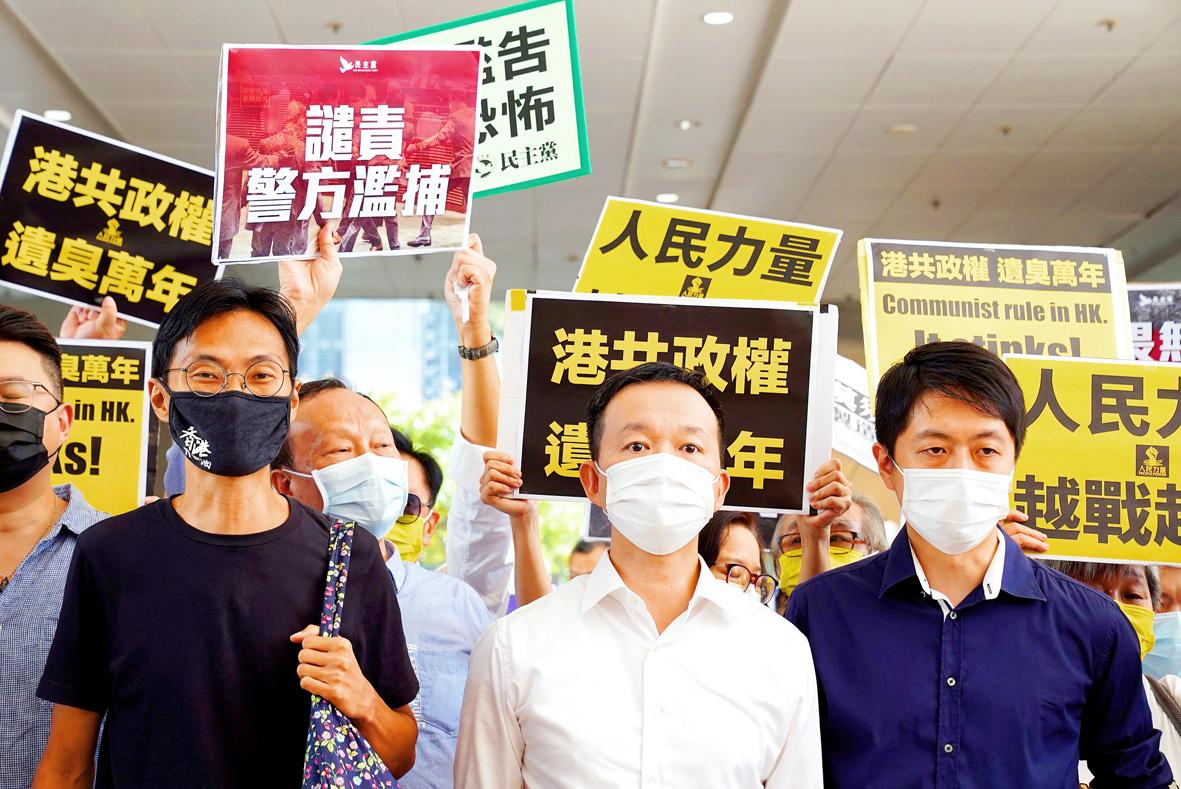The US, Britain, Australia, Canada and New Zealand have accused China of contravening its legally binding international commitments by ousting pro-democracy lawmakers from Hong Kong’s Legislative Council.
The foreign ministers of the five allies said that Beijing has gone against its 1984 promise to preserve autonomy in the territory after it was handed back to China in 1997.
The removal of four opposition lawmakers triggered the en masse resignation of their remaining colleagues, the latest move in a deepening crackdown against Beijing’s critics following last year’s huge and often violent democracy protests.

Photo: Reuters
“China’s action is a clear breach of its international obligations under the legally binding, UN-registered Sino-British Joint Declaration,” the nations said in a statement, reiterating individual remarks.
The foreign ministers said that the latest move appeared to be part of a “concerted campaign to silence all critical voices” in Hong Kong.
“For the sake of Hong Kong’s stability and prosperity, it is essential that China and the Hong Kong authorities respect the channels for the people of Hong Kong to express their legitimate concerns and opinions,” said the alliance, known collectively as the “Five Eyes.”
Chinese Ministry of Foreign Affairs spokesman Zhao Lijian (趙立堅) yesterday hit back against the accusation, calling it a “blatant violation of international law” and saying that “any attempt to exert pressure on China ... is doomed to fail.”
“No matter if they have five or 10 eyes, if they dare to damage China’s sovereignty, security and development interests, they should beware of being blinded,” Zhao said.
China’s leaders deny breaching their pre-handover promises and have said that Western powers have no right to interfere in how Hong Kong is run.
Only half of the legislature’s seats are elected by popular vote, a mechanism designed to ensure a permanent pro-Beijing majority.

NATIONAL SECURITY THREAT: An official said that Guan Guan’s comments had gone beyond the threshold of free speech, as she advocated for the destruction of the ROC China-born media influencer Guan Guan’s (關關) residency permit has been revoked for repeatedly posting pro-China content that threatens national security, the National Immigration Agency said yesterday. Guan Guan has said many controversial things in her videos posted to Douyin (抖音), including “the red flag will soon be painted all over Taiwan” and “Taiwan is an inseparable part of China,” while expressing hope for expedited “reunification.” The agency received multiple reports alleging that Guan Guan had advocated for armed reunification last year. After investigating, the agency last month issued a notice requiring her to appear and account for her actions. Guan Guan appeared as required,

A strong cold air mass is expected to arrive tonight, bringing a change in weather and a drop in temperature, the Central Weather Administration (CWA) said. The coldest time would be early on Thursday morning, with temperatures in some areas dipping as low as 8°C, it said. Daytime highs yesterday were 22°C to 24°C in northern and eastern Taiwan, and about 25°C to 28°C in the central and southern regions, it said. However, nighttime lows would dip to about 15°C to 16°C in central and northern Taiwan as well as the northeast, and 17°C to 19°C elsewhere, it said. Tropical Storm Nokaen, currently

PAPERS, PLEASE: The gang exploited the high value of the passports, selling them at inflated prices to Chinese buyers, who would treat them as ‘invisibility cloaks’ The Yilan District Court has handed four members of a syndicate prison terms ranging from one year and two months to two years and two months for their involvement in a scheme to purchase Taiwanese passports and resell them abroad at a massive markup. A Chinese human smuggling syndicate purchased Taiwanese passports through local criminal networks, exploiting the passports’ visa-free travel privileges to turn a profit of more than 20 times the original price, the court said. Such criminal organizations enable people to impersonate Taiwanese when entering and exiting Taiwan and other countries, undermining social order and the credibility of the nation’s

‘NATO-PLUS’: ‘Our strategic partners in the Indo-Pacific are facing increasing aggression by the Chinese Communist Party,’ US Representative Rob Wittman said The US House of Representatives on Monday released its version of the Consolidated Appropriations Act, which includes US$1.15 billion to support security cooperation with Taiwan. The omnibus act, covering US$1.2 trillion of spending, allocates US$1 billion for the Taiwan Security Cooperation Initiative, as well as US$150 million for the replacement of defense articles and reimbursement of defense services provided to Taiwan. The fund allocations were based on the US National Defense Authorization Act for fiscal 2026 that was passed by the US Congress last month and authorized up to US$1 billion to the US Defense Security Cooperation Agency in support of the